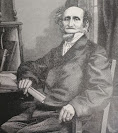A shameless slander of the Missouri Synod.
The Herald und Zeitschrift of May 8 of this year carried the following under the title “Missouri in the East.” …………
So far the publications. From the above it is clear that here is a case of public malicious slander, such as probably does not often happen. Pastor Sieker does not say too much when he speaks of a “sad spirit of slander” which shows itself here among the opponents of the Missouri Synod. That sad fellow who dares to sign himself “Veritas” wanted to slander the Missouri Synod, because he could easily inform himself about the actual facts, if they were hidden from him in some points. But no, after a miserable phrase, which is supposed to be an acknowledgement of the godliness of many pastors of the Missouri Synod “especially in the West,” he publishes to the world: “But with Christian discipline, one sees that it is gone” (in the Missouri Synod). And the Herald und Zeitschrift puts out such slanders. It pretty much outdoes anything this newspaper has ever been guilty of against the Missouri Synod. The Missouri Synod is by and by no longer a newcomer in America. It has now been in existence about 40 years, and there are 42 volumes of Der Lutheraner before the world. Has the Missouri Synod ever approved of the worldly nature? Has it not, on the contrary, always and unceasingly rejected the worldly nature, in whatever form it may take? Even in the congregations of the Missouri Synod, of course, there have always been many infirmities and damages, and there is no lack of them now. There are perhaps more infirmities in our eastern congregations than in the so-called western ones, due to the more degenerate ecclesiastical environment. But show us even one line in 42 volumes of Der Lutheraner, in which a foul peace with the world and its nature would be spoken! Name one synodal assembly where a lax ecclesiastical practice was approved! It is true that among us it is agreed that the weak should be treated gently and with patience. But it is also agreed among us to this day that the worldly nature, in whatever form it may leave, is never to be left unchallenged, but is to be punished with God's Word until it finally comes to the decision whether to keep it with Christ or with the world. This is the past ecclesiastical history of the Missouri Synod. The Herald und Zeitschrift is also well acquainted with it. Where does this paper get the courage to publish a sentence like this in response to a “Veritas” report, which bears the stamp of feigned indignation, malice and lies on its forehead: “Christian discipline, one sees, is gone” (in the Missouri Synod). — It is true, the Herald und Zeitschrift took up Pastor Brohm's rebuttal and Pastor Halfmann's explanations in the number of May 22 the Herald und Zeitschrift also declares in a prefatory note that Mr. Pastor Halfmann “has certainly justified himself completely in the eyes of all who think legally.” But it then pulls itself out of the affair too easily. First of all, it does not utter a word of censure against “Veritas", whom every righteous synod would take into synod discipline because of his obvious slander. Then, the Zeitschrift does not recant its own slander. In the number of May 22 it writes: “Whatever the congregation may have been guilty of, the pastor has thereby” (with his protest) “certainly justified himself in the eyes of all right-thinking people. Pastors who find themselves facing gross abuses can take this as an example. We are heartily pleased to be able to hold up this pastoral testimony to all scoffers and blasphemers from this sad history.” Fourteen days earlier, however, the same Zeitschrift had taken occasion from Halfmann's case to accuse the Missouri Synod of chastisement, and had written that the “witness's” assertion that “we Missourians alone are serious” in doctrine and practice was proving to be a lie again and again in his immediate surroundings. Where is the retraction and the honest open confession of having recklessly and falsely accused the Missouri Synod and having grossly sinned against truth and love? But here we experience again that those who complain so loudly about the lack of love in those who, for the sake of their conscience, resolutely reject all false teaching, lack love in themselves before others. F. P. [Pieper]
- - - - - - - - - - - - - - - - - - -













